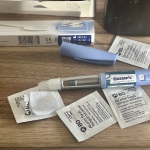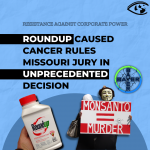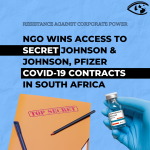National Breast Cancer Industry Month
If Hallmark can make Mother's Day, Father's Day and National Secretary's
Week into national holidays, why not other companies?
Perhaps that was going through the mind of executives at AstraZeneca,
the drug manufacturer, when they decided to invent National Breast
Cancer Awareness Month.
This October has been the fifteenth annual National Breast Cancer
Awareness Month, and the event is gaining an ever-higher profile. It
garners abundant media attention, and is a growing favorite for corporate
charitable work. Ms. PacMan, the first official spokesperson for the
National Association of Breast Cancer Organizations (NABCO), is working to
promote breast health throughout October. Georgette Klinger, a cosmetics
company, is donating a portion of its October revenues to NABCO. Hickory
Farms has produced a National Breast Cancer Awareness Month gift basket,
the Gift of Hope, that includes breast cancer educational information.
Loehmann's, the fashion retailer, hosted special shopping nights at its
Manhattan and Beverly Hills stores, donating a portion of proceeds to
NABCO. Bristol-Myers Squibb and the California-based Longs Drug Stores are
donating a portion of their October sales of select products to NABCO.
American Express is encouraging people to Shop for a Cure in September and
October, when certain AmEx purchases will trigger a corporate donation to
breast cancer research.
National Breast Cancer Awareness Month's core message is the importance
of early detection, with a special emphasis on regular mammography
exams.
So lots of organizations, media outlets and companies join together to
deliver a health promotion message. Who could object?
Barbara Brenner, for one. Brenner is executive director of Breast Cancer
Action, a hard-hitting grassroots organization based in San Francisco.
"Because of Breast Cancer Awareness Month, everybody thinks wearing a
pink ribbon and racing for the cure will solve the problem," she says.
The soft sell approach, combined with the exclusive focus on early
detection, keeps people from understanding "what is really going on," she
says. On the one hand, while women who detect breast cancer early are
better off than those who detect it late, Brenner says, early detection is
certainly no guarantee. On the other hand, the focus on detection comes at
the expense of any critical questioning about causation and intelligent
approaches to seeking a cure.
A dramatically different approach is called for, Brenner says.
First, cancer prevention efforts must embrace the precautionary
principle -- the idea that when an activity raises threats of harm to
human health or the environment, precautionary measures should be taken
in the absence of scientific certainty. As part of the Bay Area Toxics
Link Coalition, Breast Cancer Action is pushing a Stop Cancer Where It
Starts initiative that has succeeded in getting San Francisco, Oakland
and Berkeley to incorporate the precautionary principle in local
regulations.
Second, Brenner says, the cancer research agenda should be restructured.
Breast Cancer Action is calling for a national Rachel Carson Project to
fund a half dozen multi-disciplinary cancer research centers that would
focus on finding more effective and less toxic cancer treatments, and on
researching cancer causes. A key element of the plan: products invented
by the centers cannot be patented.
This is not exactly the agenda of the cancer establishment, which is
hostile to the idea that environmental causation is a significant part of
the story of the rising incidence of breast cancer in the United States.
And by now, National Breast Cancer Awareness Month is both a creature of
the entire cancer establishment and a reflection of its ideology. As Kathy
Paranzino, program manager at AstraZeneca says, National Breast Cancer
Awareness Month "has taken on a life of its own."
Founded by Zeneca, then a subsidiary of Imperial Chemical Industries
(ICI), a giant chemical firm, along with the American Academy of Family
Physicians and Cancer Care Inc., National Breast Cancer Awareness Month is
now governed by a 17 organization board that includes the American Cancer
Society, the Centers for Disease Control, the National Cancer Institute
and the Susan G. Komen Breast Cancer Foundation. All funding for the
official activities comes from the AstraZeneca Healthcare Foundation,
though board members offer in-kind support and countless organizations
conduct their own activities during the month.
AstraZeneca, no longer connected to ICI, now has no direct corporate
interest in turning attention away from potential links between
pesticides, chemical pollution and breast cancer. But as maker of
tamoxifen, the controversial drug that has been approved to reduce the
risk of contracting cancer in women with a high risk of breast cancer, it
remains highly desirable for the company to be associated in the public
mind with efforts to address breast cancer.
Other corporate members of the cancer establishment -- such as General
Electric, the heavily advertised maker of mammography machines and also a
major industrial polluter -- have a more direct interest in turning
companies away from potential environmental causes of cancer.
The prospect of companies from Bristol Myers Squibb to American Express
rallying in support of Stop Cancer Where It Starts month seems slight.
Instead, this effort will be carried forward by an energetic, grassroots
environmental health movement.
Russell Mokhiber is editor of the Washington, D.C.-based Corporate Crime Reporter. Robert Weissman is editor of the Washington, D.C.-based
Multinational Monitor.
- 122 Pharmaceuticals



